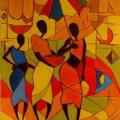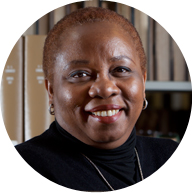23. Nkiru Nzegwu on Gender in African Tradition
An interview with Nkiru Nzegwu on matriarchy, sexuality, and gender fluidity in Africa (with a quick chat at the end about her work on African art).
Themes:
• N. Nzegwu, “Gender Equality In a Dual Sex System: The Case of Onitsha,” Canadian Journal of Law and Jurisprudence 7 (1994), 73-95.
• N. Nzegwu, “Chasing Shadows: The Misplaced Search for Matriarchy,” Canadian Journal of African Studies 32 (1998), 594-622.
• N. Nzegwu (ed.), Contemporary Textures: Multidimensionality in Nigerian Art (Binghamton: 1999).
• N. Nzegwu, “Crossing Boundaries: Gender Transmogrification of African Art History,” Ijele: Art eJournal of the African World 1 (2000).
• N. Nzegwu, “The Epistemological Challenge of Motherhood to Patriliny.” JENdA: A Journal of Culture and African Women Studies 5 (2003).
• N. Nzegwu, “Feminism and Africa: Impact and Limits of the Metaphysics of Gender,” in A Companion to African Philosophy, ed. K. Wiredu (Cambridge, MA: 2004), 560-69.
• N. Nzegwu, Family Matters: Feminist Concepts in African Philosophy of Culture (Albany, NY: 2006).
• N. Nzegwu, “Osunality (or African Eroticism),” in African Sexualities: A Reader, ed. S. Tamale (Cape Town: 2011), 253-70.







Comments
Well, I know fluid mechanics,
Well, I know fluid mechanics, I have even lectured about fluid mechanics at a university level, but I do not know what "gender fluidity" is..
Who invents such terms?
I guess if one invents enough such terms and chains them together, he has a "new" field of "philosophy" at hand, like Africana "philosophy".. What elevates one's sexual choices to the level of philosophy is beyond me..
No, I haven't listened the episode and yes, this is a hostile comment..
I like hopwag very much and I am a very dedicated listener.. But not this "africana" stuff.. There is a very rich african mythological tradition. But there is no african philosophy, even when we include egyptian and ethiopian traditions.. And I do not see any benefit in blurring the boundary between myth and philosophy.. Yes, they are very closely related. No, they are not the same thing...
In reply to Well, I know fluid mechanics, by mehmet
Hostility
I don't think "gender fluidity" is a particularly strange concept: the idea is just that social roles that we might intuitively expect to be occupied by biological males and females are in fact more "blurry," if you will, e.g. the phenomenon of the "female husband" already discussed in the previous episode. You're not obligated to find this interesting of course, but it is a real thing (and frankly I would have thought it is just obviously interesting, and philosophically so).
You should probably stick with the series for a few more episodes at least because very soon we are going to be getting to scholars who objected precisely to the merging of myth or traditional, popular belief with philosophy, and argued that "African philosophy" should be defined differently as a result (for example, restricting it only to self-consciously "philosophical" written texts). It's actually a pretty complicated and long-running debate so I'd suggest keeping an open mind about it and then deciding what you think after hearing the pluses and minuses of both sides.
In reply to Hostility by Peter Adamson
I have to admit that I am not
I have to admit that I am not convinced so far by this series that there is an *overarching* thing called Africana philosophy. Emphasis on overarching, as I find much of the material to be interesting and valuable, whether it is the material from Egypt (which seems more like philosophy to me) or the folk wisdom of various tribes. Because I value what wisdom there is to be found there, I am willing to set aside the question of whether it should be called philosophy.
So rather than take issue with the Africana label, I'll say that the really disappointing aspect of the series for me is that much of this material is being presented through the lens of modern commentators who are interested in African folklore and folk wisdom primarily insofar as they validate some modern (and Western!) ideology such as feminism, Marxism, gender theory etc. If African thought is presented as fodder for various Western ideologies does it remain African? (Is this a subtle form of what Pope Francis calls "ideological colonization"?) Of course, what is more important is not what is African or Western but what is true (though no doubt many of these same scholars would scoff at that).
So this is the first episode of this series that after a couple minutes, I have decided not to listen to. I would rather just hear about the tribal beliefs themselves - if they are philosophy on their own, after all, we shouldn't need academic philosophers to provide an ideological filtration system.
In reply to I have to admit that I am not by Thomas V Mirus
Ideology
I in turn have to admit that this reaction leaves me scratching my head a little. I don't recall that there was much in the way of explicit ideological filter in what we have looked at; the only thing that springs to mind is Kiros' fairly explicit Marxism but even that was not in play when we discussed his views on Ethiopian philosophy. I would resist the idea that merely paying attention to how women and gender have been perceived in African (or any other) soceities is "ideological." We did point out the interest of the material to contemporary feminist philosophy towards the end of the previous episode but apart from that, the information we discussed in that episode and also discussed by Nzegwu in this interview is much like the information we provided on, say, African ideas of the soul or divination. Of course history of philosophy is frequently blind to anything but the concerns of dead, rich, European men, which creates the illusion that there is an "ideology" at play when we so much as mention ideas concerning gender (or non-European thought), but in fact gender is a fundamental aspect of human existence and thus just something that philosophers need to think about, whatever their ideological approach. To put it another way, refusing even to think about it would itself be ideological, and not in a good way.
As for "overarching" we have discussed that a lot in response to other comments here on the site, e.g. on the first episode in this series. I'll just repeat that in my view African(a) thought is no more or less unified than European philosophy or Indian philosophy. If you think about it at that level and with those comparisons, as opposed to thinking that African(a) thought needs to coalesce into just one thing that is the size of, say, medieval scholasticism, or early modern Empiricism, then that might help.
In reply to Ideology by Peter Adamson
Coalescing
Fair points. It may be that I am hypersensitive to anything that could be taken as ideological because of how much that stuff is constantly being shoved down my throat as a New Yorker in 2019, so it gets magnified and exaggerated in my perception of the podcast.
With European philosophy, it does seem that even when the views are widely diverging, there is a kind of chronological continuum that is being referred to - so a modern rationalist would feel the need to respond to ancient or medieval philosophers, even to disagree with them or to throw out their method for a new one. Whereas in African philosophy, before modernity at least you probably aren't going to have someone in Ghana commenting on what some sage said on the other side of the continent 2500 years earlier. But you might argue for a broadly "African" point of view on things allowing for some differences. So in that sense do you think if African philosophy coalesces it would be more in a horizontal way as opposed to Europe's vertical tradition, so to speak?
In reply to Coalescing by Thomas Mirus
Coalescing
I think it might be both "horizontal" and "vertical" but if I had to pick just one I'd go for vertical. As I commented in reply to a remark left re. some other episode, you can pretty easily draw chronological links between everything we've covered so far (Egypt to Ethiopia is easy, Ethiopia connects straightforwardly to Islam, and both the Christians of Ethiopia and the Muslims are contending with the pre-existing traditional cultures they considered "pagan"). This will (I think) be even more obvious as we go along, with later Africana thinkers calling back to traditional African, as well as ancient Egyptian, ideas.
As I also commented somewhere else, these vertical connections are at least as robust as the ones connecting, say, Anaxagoras and Hume. Probably more so.
In reply to Coalescing by Peter Adamson
Ok, thanks as always for
Ok, thanks as always for taking the time to respond!
In reply to Coalescing by Peter Adamson
Follow-up
Just to follow up—I have now listened to this one and found it a lot more interesting and less ideological than I expected. I’m sorry for jumping to a conclusion as far as this episode is concerned! Prof. Nzegwu is a good guest.
It would have been helpful if she had clarified that the marriages between women are not based on a sexual relationship (which is what I found out when I looked into it a bit more), because otherwise Westerners will probably come away with the impression that “lesbian” marriages are a thing in Igbo society.
With that in mind, surely the Igbo do have some way, if not a single word, to refer to a marriage that involves a sexual relationship between a biological male and female and results in reproduction? Perhaps they do not have a different word for the wife in this marriage vs. the wife who is called that because she is not a biological member of the family, but they must have some way of recognizing and referring to basic biological realities.
In reply to Hostility by Peter Adamson
PS
To be clear, I intend to continue listening to the series as a whole. And I don't intend to discourage you or Chike, since I very much appreciate the work you put in.
I will add, though, that I think focusing too much on various contemporary scholars' theories of interpretation tends to work against the argument that the primary material itself is of philosophical interest (though I think it is!). Not that interpretation itself is not an interesting philosophical subject, but it's a different subject than the content of what is being interpreted, and one in which a little goes a long way - at least for me (and now that I think of it, I think the one part of the Western series where I really started tuning out was the stuff on Jewish textual interpretation, so maybe that tells you something about the range of my philosophical interests).
Great Interview
This was one of my favorite interviews. Honestly, I feel like I'm repeating this to myself when it comes to the series on africana philosophy. In the same way your series made me fall in love with the history of philosophy in the Islamic world, you and Chike are doing the same thing with africana philosophy.
More than anything, it's wonderful to listen and learn from these amazing scholars on the show. Never, in any of my philosophy classes during my bachelor's program, did we discuss philosophy on the african continent. While we did discuss caribbean in the context of marxist political thought, our program did not go much further than that. The interviews, along with the reading recommendations, have been a great educational resource for me, as a student of philosophy who was never exposed to these traditions in my regular curriculum. In my view, it's quite horrifying that the university I attended did not offer any classes on africana philosophy. There's still a significant amount of work that needs to be done in order to change the situation. I sincerely hope that this subject gains more attention among philosophy professors and students alike. Lastly, I intend to convince some former professors of mine to share your interview with Professor Nzegwu, to help that happen a bit. So, thank you.
In reply to Great Interview by Jose
Thanks
Thanks for this very encouraging response! To be honest hardly any universities offer courses on the topic so it is not that surprising that it wasn't available when you were a student, but it does seem to be getting more and more common. Hope you will continue enjoying the series, and thanks for spreading the word!
In reply to Great Interview by Jose
So glad you're enjoying!
Let me echo Peter in thanking you for your response. To hear that we are leading some listeners to fall in love with Africana philosophy is truly gratifying, and this of course goes double for me since it is, from a research perspective, my greatest love! And I agree with you about what a fabulous interview Prof. Nzegwu provided.
Pitfalls
Just one more comment - this is also why I have never felt able to follow up on my interest in the native peoples of North America, because it seems difficult to find reading material that is not pushing an agenda one way or another.
Add new comment